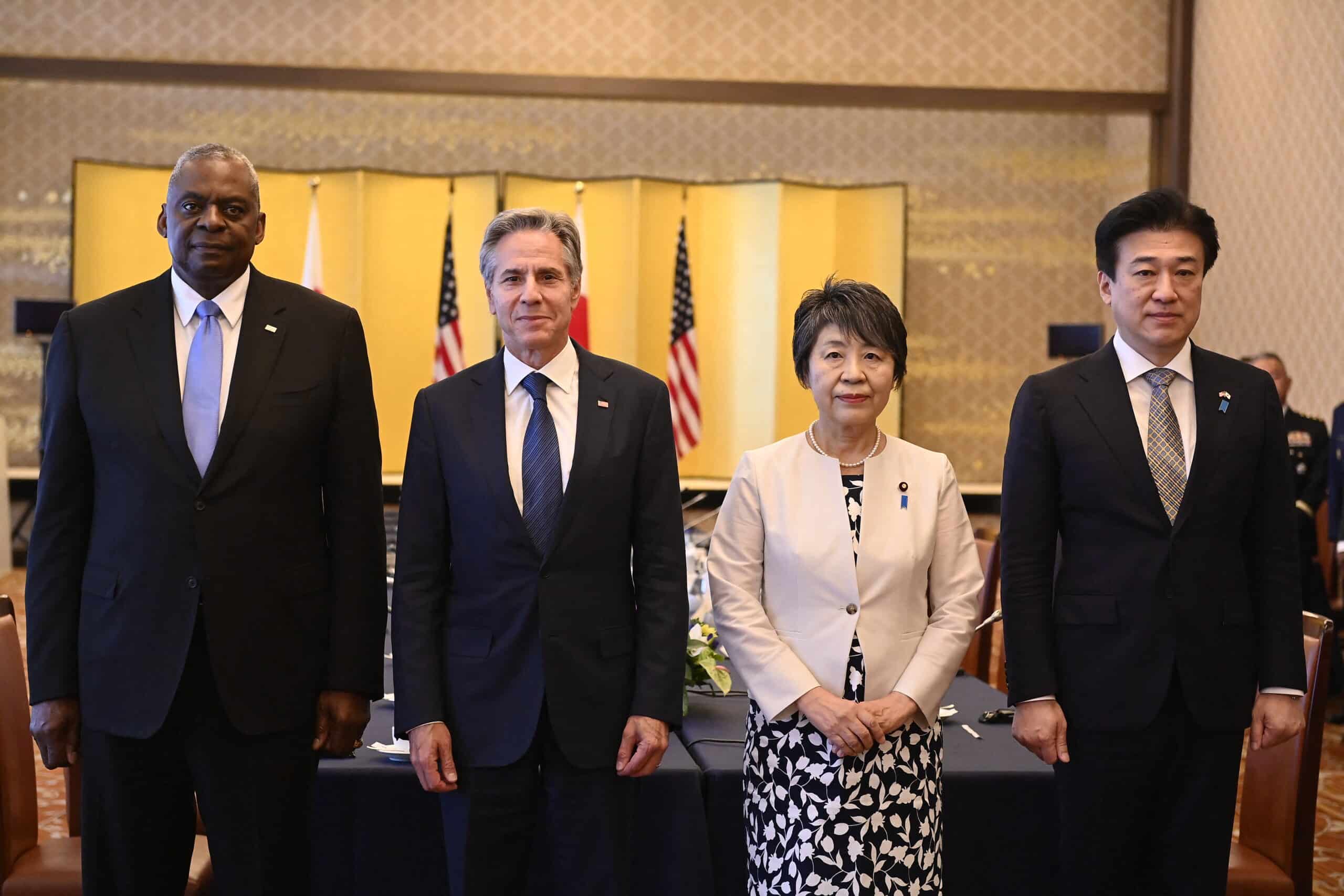US, Japan take swipe at China and Russia in high-level talks

US Secretary of State Antony Blinken (2nd L) and US Secretary of Defense Lloyd Austin (L) pose with Japan’s Foreign Minister Yoko Kamikawa (2nd R) and Japan’s Defense Minister Minoru Kihara (R) at the start of the “Foreign and Defense Ministerial (2+2) Meeting” at the Iikura Guest House in Tokyo on July 28, 2024. (Photo by David Mareuil / POOL / AFP)
TOKYO, Japan — The United States and Japan issued scathing verbal attacks on China and Russia on Sunday after high-level discussions aimed at enhancing already close defense collaboration between Tokyo and Washington in an increasingly unstable region.
A joint statement after “2+2” talks between US Secretary of State Antony Blinken, Defense Secretary Lloyd Austin, and their Japanese counterparts said China’s “foreign policy seeks to reshape the international order for its own benefit at the expense of others.”
They “reiterated their strong objections to the PRC’s (People’s Republic of China) unlawful maritime claims, militarization of reclaimed features, and threatening and provocative activities in the South China Sea,” the statement said.
China’s “destabilizing actions in this region include unsafe encounters at sea and in the air, efforts to disrupt other countries’ offshore resources exploitation, as well as the dangerous use of Coast Guard and maritime militia vessels,” it said.
They also expressed concern about China’s “ongoing and rapid expansion of its nuclear weapons arsenal, which continues without any transparency regarding its intent and which the PRC refuses to acknowledge, despite publicly available evidence.”
The statement “highlighted with concern Russia’s growing and provocative strategic military cooperation with the PRC, including through joint operations and drills in the vicinity of Japan, and the PRC’s support for Russia’s defense industrial base.”
They also “strongly condemned deepening Russia-North Korea cooperation, exemplified by Russia’s procurement of ballistic missiles and other materiel from North Korea in direct violation of UNSCRs (UN Security Council resolutions) for use against Ukraine.”
The statement, issued after Blinken’s and Austin’s talks with Japanese Foreign Minister Yoko Kamikawa and Defense Minister Minoru Kihara, also confirmed plans to establish in Japan a new Joint Force Headquarters, headed by a three-star US commander, for the 54,000 military personnel stationed there.
This will serve as a counterpart to Japan’s planned Joint Operations Command for all its armed forces, making the two militaries more nimble in the case of a crisis over Taiwan or the Korean peninsula.
US forces in Japan currently report back to Indo-Pacific Command in Hawaii, around 6,500 kilometers (4,000 miles) away and 19 hours behind.
‘New era’
The statement called the US-Japan alliance “the cornerstone of peace, security, and prosperity in the Indo-Pacific region and beyond”.
Japan has been shedding its strict pacifist stance in recent years, ramping up defense spending and moving to obtain “counterstrike” capabilities.
President Joe Biden and Prime Minister Fumio Kishida announced a “new era” in cooperation at a summit at the White House in April.
Japan and the Philippines — Blinken’s and Austin’s next stop for a “2+2” — signed a defense pact this month that will allow the deployment of troops on each other’s territory.
That followed the first trilateral summit between the leaders of Japan, the Philippines, and the United States in Washington in April.
Japan and South Korea, like the Philippines, have also moved to bury the hatchet over World War II, with Biden hosting both countries’ leaders at Camp David last August.
Ahead of the Japan-US “2+2” meeting, Austin and Kihara held trilateral talks with Shin Won-sik, the first South Korean defense minister to visit Japan in 15 years.
They signed a memorandum of cooperation to further tighten ties, including on information sharing and trilateral exercises.
“Trilateral cooperation among Japan, the United States, and South Korea has become stronger and unshakable even under various changes in the international situation,” Kihara told reporters after the meeting.
Extended deterrence
The discussions between Japan and the United States also covered enhancing Washington’s “extended deterrence” commitment to use its military capabilities, including nuclear weapons, to protect Japan.
China’s military modernization, North Korea’s nuclear and missile work, and nuclear saber-rattling in the Ukraine war have unsettled Japan, said Naoko Aoki, a political scientist at the RAND think tank.
“[It] is important for the United States to reassure Japan of its commitment and signal to potential adversaries that the alliance remains strong and that the United States is committed to using nuclear weapons if necessary to defend Japan,” she told AFP.
On Monday, Blinken and Kamikawa will meet S. Jaishankar and Penny Wong, their Indian and Australian counterparts in the Quad, an alliance seen as a bulwark against China.